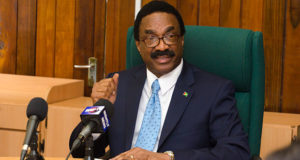
In an attempt to provide some clarity on what may have led to the delay in Guyana acquiring the permission to set up a law school, Attorney General and Legal Affairs Minister Basil Williams has now shifted blame on Chairman of the Council of Legal Education (CLE), Reginald Armour.
While Williams insists that the CLE had in 2017 given Guyana approval to establish this school, he said Armour had principally stated that the Council should defer the establishment of more law schools.
There are presently three laws schools in the Caribbean offering the Legal Education Certificate (LEC). These are the Norman Manley Law School in Jamaica, the Hugh Wooding Law School in Trinidad and Tobago, and the Eugene Dupuch Law School in The Bahamas. The AG told a press conference on Monday that Armour had placed the issue of whether Guyana had received approval for the establishment of a local law school on the CLE’s agenda last year. According to him, a press statement was also issued in this regard without the Council’s approval.
But more than that, Williams is alleging that former Attorney General and Minister of Legal Affairs, Anil Nandlall, was behind Armour’s move to put the matter on the agenda. This, he argued, was an unprecedented move, since the CLE Chair did not consult with him, but rather with an Opposition member.
Further, Williams asserted that such a move taken by a treaty organisation could have implications for the Chairman. As such, he hinted that Guyana could perhaps take this matter to the Caribbean Community (Caricom) to have that body consider Armour’s perceived handling of this issue.
“We don’t know what the motivation of Mr Armour (was), but certainly I don’t believe he is acting in a manner in which a person who is a custodian of a member organisation should; because, as far as I know…the agenda is set by people in the sitting Government, and not people from the Opposition,” he posited.
He continued, “If this Chairman continues to act in the manner in which he is acting — against the interest of Caricom — we would have to take the matter to the Heads (Heads of Government) again; but I am not sure Guyana (would) be comfortable with such a person remaining in office to chair this organisation.”
The AG went on to state that the CLE Chairman’s action is unheard of, particularly coming from a person in an international public service organisation “…and we are wondering whether it would be in our interest for the person to continue (serving in that capacity).”
Williams also reiterated that a Review Committee cannot overrule a decision taken by the Council in 2017 in regard to the issue.
The Attorney General had, in early December 2017, said in a statement that the CLE Chairman was relying on a report of a Review Committee to state that the CLE never gave permission to Guyana to establish its own Law School after decades in the belief of the Guyanese legal fraternity.
Former Attorney General Anil Nandlall had queried if graduates of this proposed law school would be eligible to practise anywhere else in the Caribbean or the world, or whether graduates would be qualified to practise only in Guyana.
He also questioned the quality-control scrutiny, or steps taken to verify and authenticate the academic integrity and standards of the partners that would be assisting Guyana to set up the school.
Government, in January 2017, announced it would start a project to establish the JOF Haynes Law School of the Americas. The project comes after some two decades of lobbying for an alternative to the three existing laws schools currently servicing the Caribbean region.
The JOF Haynes Law School is being established through a public-private partnership entered into between the Government of Guyana, the Law School of the Americas (LCA) and the University College of the Caribbean (UCC), and will add to the existing options available to holders of a Bachelor of Laws (LLB).
The feasibility study for the establishment of the School here is yet to be conducted.



